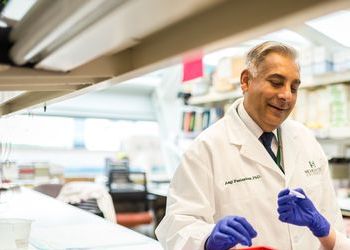Hungry for Change
Mike Hamm is addressing the fragility and scarcity of food for a growing global population
Hungry for Change
Mike Hamm is addressing the fragility and scarcity of food for a growing global population
October 15, 2014Many researchers at Michigan State University are concerned about climate change, fresh water, energy costs and food availability.
Mike Hamm, the C.S. Mott Chair of Sustainable Agriculture, understands the issues.
“I think that one of the biggest crises we face as a country over the next two decades is: ‘Who’s going to grow the food?’” said Hamm.
By 2050, it is estimated that 70 percent of the developed world will live in urbanized areas. And the population will have grown to nine billion people worldwide.
Yes, nine billion.
Hamm, who came to MSU in 2002 after spending 20 years at Rutgers studying human nutrition, is focused on sustainable food systems. He is asking the question: “How do we ensure advanced food security for the world’s growing population?”
“It seems to me that there are opportunities to look at the issues we’re confronted with—in Detroit, Flint, Toledo or Cleveland—that are in many ways similar to food security issues in East Africa,” he added. “It’s a big job and MSU is here to tackle it and be a key partner with others across the globe.”
Hamm, who also directs the Center for Regional Food Systems (CRFS), has become involved with other campus collaborators in the Global Center for Food Systems Innovation (GCFSI). Funded by a large US AID grant, the GCFSI looks at opportunities to improve and enhance food security in Africa and Asia.
To diversify food production across our country, Hamm has been a principal supporter of the MSU Student Organic Farm. The farmer training program is a flagship initiative and an exciting strategy to prepare the next generation of food producers.
“The students work nine to ten months on the student organic farm, where they basically run through four season production, for a year-round market,” said Hamm. “They learn how to run a business. Of how to increase acreage, assess labor needs and develop infrastructure.”
Addressing the fragility and scarcity of food for a growing global population and preparing an environmentally-conscious workforce are just some of the ways MSU is forging sustainable solutions for future generations.
90
The number of farmers markets in Michigan in the early 2000s.
340
The number of farmers markets in Michigan today.
Learn more about supporting MSU’s work to solve global problems like food security.
Author: Sarah Wardell




